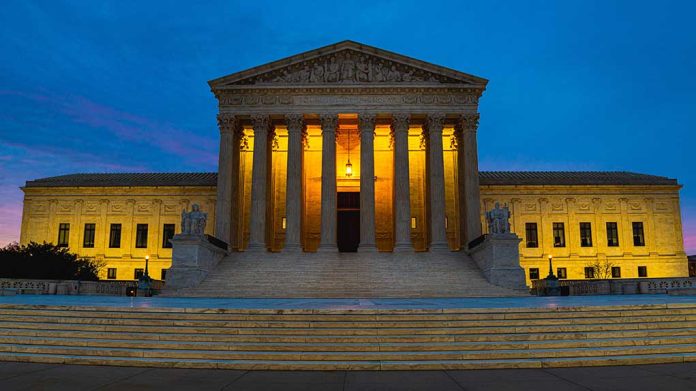
The Supreme Court heard arguments on Tennessee’s controversial ban on gender-affirming care for minors, setting the stage for a landmark decision with far-reaching implications.
At a Glance
- Tennessee’s attorney general defended the state’s ban on gender-affirming care for minors in the U.S. Supreme Court
- The 2023 law is challenged for allegedly endangering children and violating the Constitution’s equal protection clause
- The case’s outcome could impact families’ freedom to make medical decisions and the role of politicians in healthcare
- Public opinion is largely against these medical interventions for minors, with 72% of Americans opposing them according to recent polling
Tennessee’s Stand on Protecting Children
Tennessee’s Attorney General Jonathan Skrmetti took a firm stance in defense of the state’s 2023 law banning gender-affirming care for minors in front of the Supreme Court. The law, which prohibits treatments such as puberty blockers, cross-sex hormones, and surgeries for underage individuals, is now under scrutiny at the highest court in the land.
Skrmetti argued that the law is designed to protect children from “irreversible, unproven medical procedures.” This position aligns with growing concerns about the long-term effects of such treatments on young people who may not fully comprehend the consequences of their decisions.
The Supreme Court hears oral arguments Wednesday in a dispute over a Tennessee ban on certain medical treatments for transgender children. https://t.co/eFKTP4T3Mv
— Roll Call (@rollcall) December 3, 2024
Constitutional Challenges and Medical Ethics
The plaintiffs, including families of transgender children and supported by the ACLU, contend that the law violates their constitutional rights. They argue that the ban treats people differently based on sex, potentially infringing on the equal protection clause of the Constitution.
“Lawmakers recognized that there is little to no credible evidence to justify the serious risks these procedures present to youth and joined a growing number of European countries in restricting their use on minors with gender-identity issues.” Attorney General Jonathan Skrmetti stated
However, the state maintains that the law does not discriminate based on sex and that states have the authority to regulate medical practices on social issues. This stance is bolstered by recent policy shifts in European countries, which have become more cautious about providing gender-affirming treatments to minors.
Medical Community Divided
The medical community remains divided on the use of gender-transition treatments for minors. Critics argue that these interventions have unproven claims of reversibility and can lead to serious side effects. Dr. Jared Ross, a medical professional, expresses concern about the rush to provide these treatments stating: “These are desperate parents looking for answers, and this is often sold as a silver bullet … We know this path starts with social transition, moves to puberty blockers promoted as safe and reversible and eventually leads to irreversible surgeries. But we know these claims are not true,”
Adding to the controversy, David Gortler, a pharmacologist, points out potential dangers associated with certain treatments: “GnRH agonists account for 70,000 adverse reports.” This statistic underscores the need for careful consideration of the risks involved in these medical interventions.
Public Opinion and Future Implications
As the Supreme Court concludes its oral arguments, public attention is focused on this landmark case and awaits its decision anxiously. Recent polling suggests that a significant majority of Americans, about 72%, oppose these medical interventions for minors.
The outcome of this case will have far-reaching implications, not only for Tennessee but for over 20 other states with similar laws. It will likely shape the future of state regulations on transgender care and could either encourage or limit similar bans across the nation.
The debate continues to highlight the complex intersection of children’s rights, medical ethics, and the role of government in healthcare decisions. The ruling, expected in the coming months, will undoubtedly be a pivotal moment in the ongoing discussion about transgender rights and medical care for minors in America.
Sources:
Tennessee’s gender affirming care ban for children goes to U.S. Supreme Court for arguments
Supreme Court Reviewing Gender Affirming Care Ban
Supreme Court Case Exposes Medical Scandal of Epic Proportions













